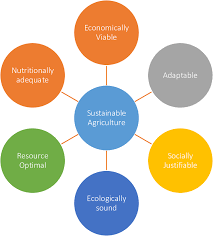The Role of Agriculture in Sustainable Development
Agriculture plays a crucial role in sustainable development by providing food, employment, and economic stability while also preserving natural resources and ecosystems. As the global population continues to grow, the demand for food increases, making sustainable agricultural practices more important than ever.
Benefits of Sustainable Agriculture
Sustainable agriculture focuses on long-term viability by balancing economic, social, and environmental factors. By adopting sustainable practices such as organic farming, crop rotation, and agroforestry, farmers can:
- Preserve soil health and fertility
- Reduce water usage and pollution
- Minimize greenhouse gas emissions
- Promote biodiversity and ecosystem resilience
- Enhance food security and nutrition
Challenges Facing Sustainable Agriculture
Despite its benefits, sustainable agriculture faces several challenges that hinder its widespread adoption. These challenges include:
- Lack of awareness and education about sustainable practices
- High initial investment costs for transitioning to sustainable methods
- Market demand for cheap, mass-produced food over sustainably grown produce
- Policies that favour conventional farming practices over sustainable alternatives
The Path Forward: Promoting Sustainable Agriculture
To overcome these challenges and promote sustainable agriculture on a global scale, collaboration among governments, farmers, consumers, and businesses is essential. Key strategies include:
- Educating farmers about the benefits of sustainable practices through training programmes and workshops
- Incentivising the adoption of sustainable methods through subsidies and financial support
- Raising consumer awareness about the importance of buying sustainably produced food products
- Advocating for policies that support sustainable agriculture and protect natural resources
Six Essential Tips for Sustainable Agricultural Practices
Crop Rotation
Crop rotation is a fundamental practice in sustainable agriculture that involves alternating the types of crops grown in a particular field over different seasons. This technique helps maintain soil fertility, reduce pest and disease pressure, and improve crop yields. By rotating crops, farmers can prevent nutrient depletion, control weeds naturally, and enhance biodiversity in agricultural ecosystems. Ultimately, crop rotation contributes to the long-term sustainability of farming practices by promoting soil health and resilience while minimising the need for synthetic inputs.
Water Conservation
Water conservation is a critical aspect of sustainable agriculture and development. By implementing efficient irrigation systems, capturing rainwater, and practising water-saving techniques, farmers can reduce water wastage and protect this precious resource for future generations. Conserving water not only ensures the sustainability of agricultural practices but also helps to maintain ecosystems, support biodiversity, and mitigate the impacts of climate change. Emphasising water conservation in agriculture is essential for achieving long-term environmental resilience and food security.
Organic Farming
Organic farming is a sustainable agricultural practice that prioritises the health of the soil, ecosystems, and consumers. By avoiding synthetic pesticides and fertilisers, organic farmers promote biodiversity, reduce pollution, and enhance soil fertility. Organic farming also places emphasis on animal welfare and ethical practices, contributing to a more holistic approach to food production. This method not only benefits the environment but also produces nutritious and high-quality food for consumers who value sustainability and health.
‘No-till’ Farming
‘No-till’ farming is a sustainable agricultural practice that involves planting crops without disturbing the soil through tilling. By avoiding traditional ploughing methods, ‘no-till’ farming helps to preserve soil structure, reduce erosion, and retain moisture, leading to improved soil health and fertility. This method also helps to sequester carbon in the soil, mitigating climate change impacts. Overall, ‘no-till’ farming is a valuable technique in promoting sustainable agriculture by enhancing productivity while minimising environmental harm.
Agroforestry
Agroforestry is a sustainable agricultural practice that combines tree cultivation with traditional farming methods to create a more diverse and resilient ecosystem. By integrating trees into agricultural landscapes, agroforestry offers numerous benefits such as improved soil health, increased biodiversity, enhanced water conservation, and carbon sequestration. This holistic approach not only boosts crop yields but also contributes to long-term environmental sustainability by promoting a balanced relationship between agriculture and forestry.
Energy Efficiency
Energy efficiency is a critical aspect of promoting sustainable agriculture and development. By optimising energy use in farming practices, such as irrigation, machinery operation, and processing, farmers can reduce their carbon footprint and lower operating costs. Implementing energy-efficient technologies like solar panels, energy-saving equipment, and renewable energy sources not only benefits the environment but also enhances the overall sustainability of agricultural operations. Prioritising energy efficiency in agriculture is a key step towards building a more resilient and environmentally conscious food production system.
